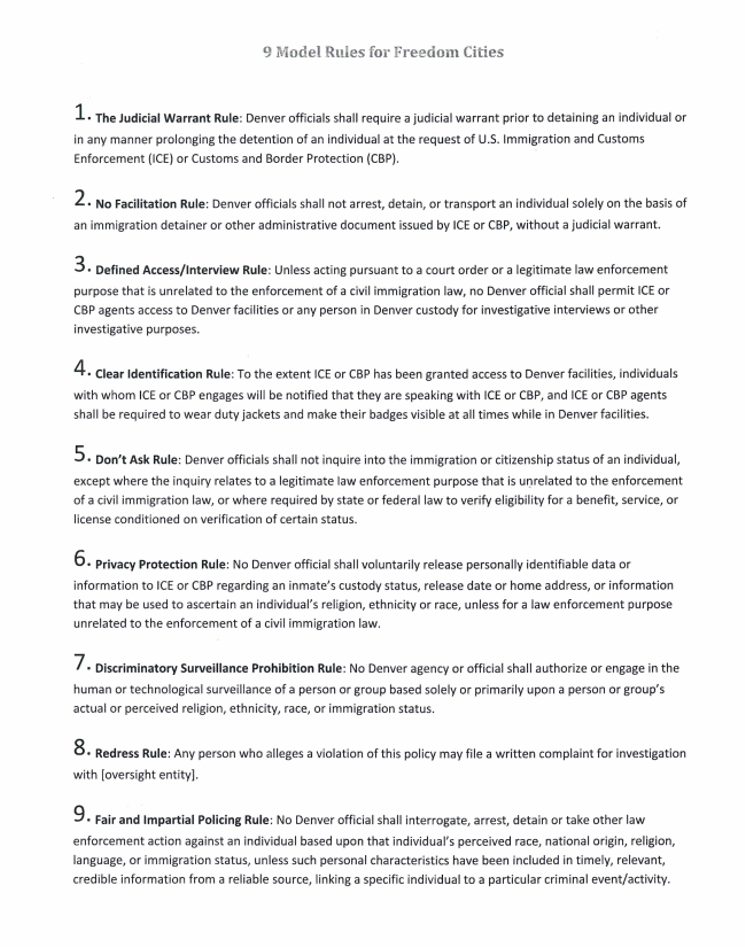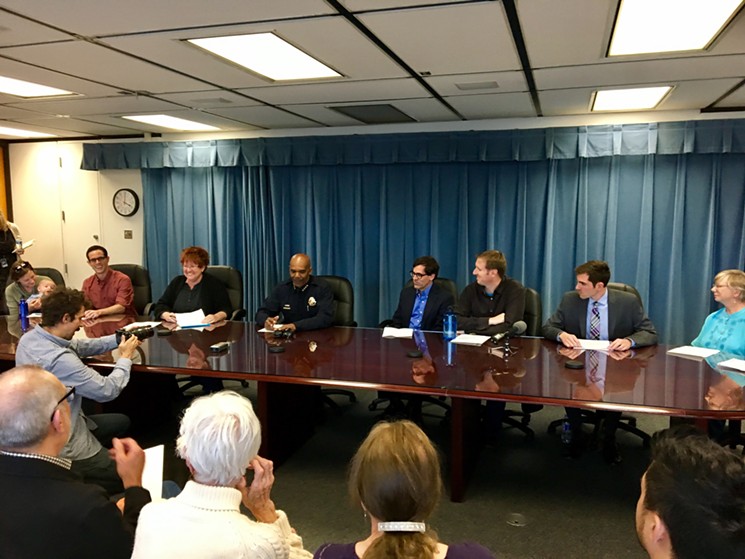After Donald Trump’s inauguration on January 20, the American Civil Liberties Union launched a major grassroots resistance platform called People’s Power. With help from the Bernie Sanders campaign, the movement’s website, peoplepower.org, has been a hub and organizing tool for creating events across the country.
On Tuesday, one of those events was in Denver, when People’s Power invited Denver Police Chief Robert White to discuss the ways in which DPD does and does not participate in federal immigration enforcement.
The group presented White with nine policy points and had him comment on whether DPD’s practices and ideologies fall in line with them.
White, who has stated since November that DPD is not in the immigration enforcement business, answered that the ACLU / People’s Power guidelines were already being adhered to (with the exception of numbers four and six, which he said he couldn’t comment on because they fall under the purview of the Denver Sheriff’s Department). Below, find all nine policy suggestions: President Trump has threatened to remove federal funding from so-called sanctuary cities that refuse to cooperate with immigration enforcement, and agents with ICE have become emboldened to conduct operations in places like courthouses with the blessings of Trump’s cabinet picks.
But just hours before the forum began on Tuesday, April 25, a major development occurred when a federal judge in San Francisco, William H. Orrick, temporarily blocked Trump’s January 25 executive order that threatens a crackdown on sanctuary cities. Orrick said that the executive order is too broad and that “federal funding that bears no meaningful relationship to immigration enforcement cannot be threatened merely because a jurisdiction chooses an immigration enforcement strategy of which the president disapproves.”
Denver has a vested interest in that particular case; although Mayor Michael Hancock has not declared the Mile High a sanctuary city, the City Attorney’s Office did send a “friend of the court” brief alongside 34 cities and counties to be considered in the case being heard before Judge Orrick in San Francisco.
Regardless of what happens next on the national level, when it comes to non-cooperation with ICE, "obviously, there are things we can do and things we can’t do," said Chief White. Denver is not going to break federal law or stop pursuing violent criminals in the name of protecting immigrant communities, he said, but the DPD also will not inquire about people’s immigration status, share that information or detain people for ICE unless presented with a legitimate criminal warrant.
As one example, White said, “If someone is pulled over for speeding, it would be completely inappropriate to ask their immigration status.”
Throughout the hour-long forum, held on the fourth floor of the Denver Police headquarters, White also took questions from the audience, which included inquires about whether DPD has any control over how and where ICE operates within Denver.
“We’ve made an agreement with ICE that they’ll notify our communications divisions when they enter [Denver],” said White. “We don’t know what they’re doing, but we know they’re there.
“We don’t police ICE, and ICE doesn’t police us,” he continued. “So we don’t have the authority to [remove] them.”
White did say, however, that DPD considers everyone equal under the law and would intervene if ICE agents themselves were clearly breaking the law in a criminal manner. He did not elaborate what that would look like, however.
When asked whether DPD could codify the nine policy points presented by People’s Power, White said, “Some are already on the books, some are not, but most are covered in training.
“I’m going to share this with the mayor,” he added.
On Thursday, April 27, at 6 p.m. at the Denver Inner City Parish, there will be another discussion around adopting formal sanctuary policies, co-hosted by the Meyer Law Office, whose principal attorney, Hans Meyer, was recently profiled in a Westword cover story.
[
{
"name": "Air - MediumRectangle - Inline Content - Mobile Display Size",
"component": "12017618",
"insertPoint": "2",
"requiredCountToDisplay": "2"
},{
"name": "Editor Picks",
"component": "17242653",
"insertPoint": "4",
"requiredCountToDisplay": "1"
},{
"name": "Inline Links",
"component": "18838239",
"insertPoint": "8th",
"startingPoint": 8,
"requiredCountToDisplay": "7",
"maxInsertions": 25
},{
"name": "Air - MediumRectangle - Combo - Inline Content",
"component": "17261320",
"insertPoint": "8th",
"startingPoint": 8,
"requiredCountToDisplay": "7",
"maxInsertions": 25
},{
"name": "Inline Links",
"component": "18838239",
"insertPoint": "8th",
"startingPoint": 12,
"requiredCountToDisplay": "11",
"maxInsertions": 25
},{
"name": "Air - Leaderboard Tower - Combo - Inline Content",
"component": "17261321",
"insertPoint": "8th",
"startingPoint": 12,
"requiredCountToDisplay": "11",
"maxInsertions": 25
}
]














